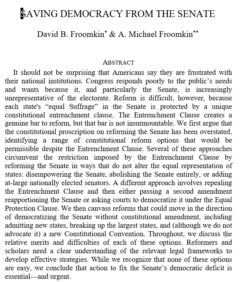 The odds that any actual law review editors read this blog is vanishingly small, but if you, gentle reader, happen to know one, please tell them about this terrific article, Saving Democracy from the Senate, co-authored with one David Froomnkin, that they might want to publish in their journal.
The odds that any actual law review editors read this blog is vanishingly small, but if you, gentle reader, happen to know one, please tell them about this terrific article, Saving Democracy from the Senate, co-authored with one David Froomnkin, that they might want to publish in their journal.
This article is the first to take stock, in a systematic and comprehensive way, of the constitutional and statutory avenues available for reforming the malapportionment of the U.S. Senate. Collecting together the various options available enables reformers to think both programmatically about the normative choices at stake and strategically about a reform agenda. This in itself is a substantial contribution, not just to constitutional theory but also to ongoing practical efforts to reform the legal architecture of U.S. democracy. Moreover, by systematizing these considerations, the article also helps to make clear the relationship between statutory and constitutional reforms of the Senate, proposing a two-track strategy for reformers.
While the work of synthesizing the options and providing a comparative analysis is the most significant contribution, the article also provides several significant and novel analytical contributions that advance legal debates in these areas:
(1) The meaning of the Article V Entrenchment Clause. The article’s claims that (a) disempowering the Senate and (b) abolishing the Senate would not violate the Entrenchment Clause are claims that have been made before, although rarely. But they are not claims that have ever, to our knowledge, received extensive analysis. The article provides this extensive analysis, explaining why a range of ambitious constitutional reforms of the Senate would not violate the Entrenchment Clause and responding to objections.
(2) The referent of the Article V Entrenchment Clause. We are not the first to suggest that the Constitution could be amended to remove the Entrenchment Clause and then subsequently amended to alter the composition of the Senate. But we provide a crisper analysis of the reason than scholars have done previously. The reason is that the referent of the Entrenchment Clause is not a provision in Article V but a provision in Article I. The Entrenchment Clause, by its language, is not a self-entrenching clause.
(3) Article V and Equal Protection. The article provides a novel argument about the relationship between the Entrenchment Clause and the application of equal protection principles to the Senate. Orts in 2019 made a related argument, but his suggestion that Congress could reapportion the Senate by statute takes an idiosyncratic view of the Entrenchment Clause. We advance the more restrained argument that, while the Entrenchment Clause at present bars the application of equal protection principles to the Senate, amendment of the Constitution to remove the Entrenchment Clause would enable reapportionment of the Senate under Reynolds v. Sims.
(4) At-large Senators. Building on our argument about what the Entrenchment Clause prohibits—and what it does not—we explore the addition of a substantial number of nationally elected Senators to make the Senate more representative of the Nation. Whether or not we kept the existing Senators, no state’s “equal Suffrage” would be altered.
(5) Statehood. The article surveys the relevant legal authorities on the admission of new states, compiling an extensive range of relevant material. In the course of discussing the currently most salient cases of Puerto Rico and DC, the Article analyzes a Twenty-third Amendment issue that has not been extensively discussed.
(6) Breaking up (and merging) states. The article provides novel analysis of practical challenges confronting breakups (and, analogously, mergers) of states. It also suggests a promising policy response to these challenges, arguing that federal legislation to mitigate states’ costs and help to incentivize state breakups would be feasible, desirable, and constitutional. This prescription is, to our knowledge, original—perhaps in part because scholars have not yet grappled with the magnitude and stakes of the problem requiring a remedy.
Although we canvas a very wide variety of alternatives, and we weigh the difficulties, virtues, and vices of each, our recommendations center on certain constitutional reforms and the admission of a few new states.
All this, and yet even with the footnotes it’s still under 30,000 words!

Thanks for this, it’s an interesting topic that deserves some attention. Sadly, I haven’t managed to clear the time to read the whole thing, nor am I a law review editor (far from it). Have you considered other avenues for getting some attention to the underlying issues?